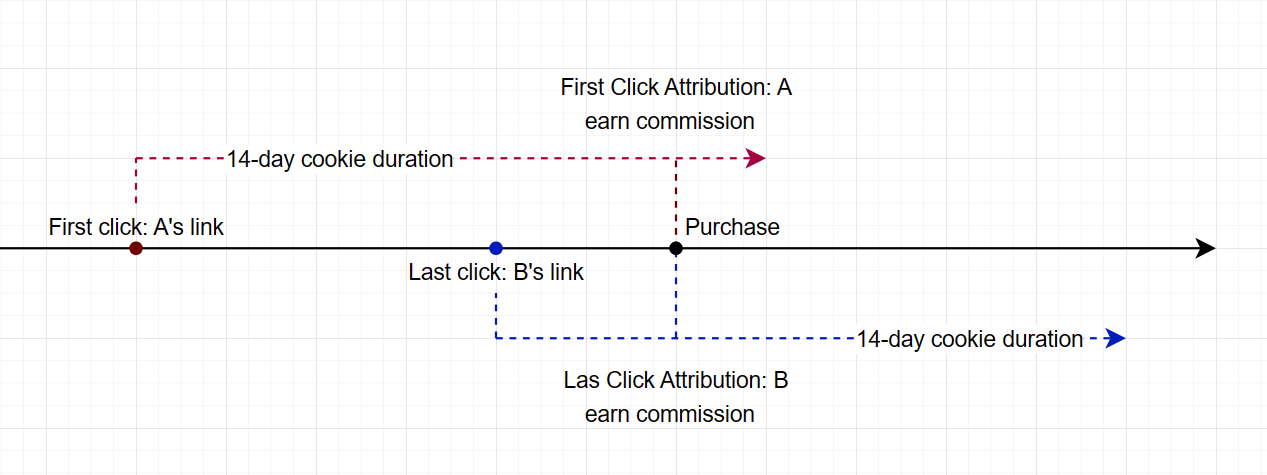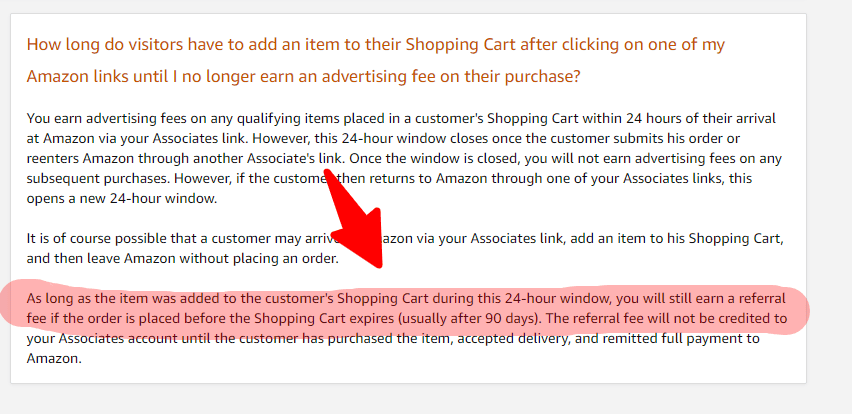What is Cookie Duration in Affiliate Marketing and How Does It Work?

Cookie duration is a big deal in affiliate marketing. It decides how long you can earn a commission after someone clicks your link. If the cookie lasts 30 days, and the person buys on day 29, you still get paid. But if they buy on day 31, you don’t.
This little detail can make or break your earnings. Some programs like Amazon offer short cookie durations—24 hours or less. Others last for months. A few even have lifetime cookies. The longer, the better for affiliates.
Think of it like leaving a digital trail. When a visitor clicks your link, a cookie (a small file) sticks to their browser. It tells the system, “This sale came from you.” If the visitor buys within the cookie’s time frame, you win. If not, tough luck.
But there’s more to it. Some programs use first-click attribution, while others reward the last click. Some cookies get overwritten by new ones. Understanding how this works helps you choose the best affiliate programs and boost your commissions.
Now, let’s break it down…
Key Takeaways
- Cookie duration is how long you can earn a commission after someone clicks your affiliate link.
- Longer cookie durations mean better chances of getting paid.
- Some programs offer 24-hour cookies, while others last 30, 60, or even lifetime.
- When a visitor clicks your link, a cookie tracks their activity for a set period.
- If they buy within that time, you earn a commission. If not, you don’t.
- Some programs use first-click attribution, others use last-click.
- Cookies can be overwritten if the visitor clicks another affiliate’s link later.
- Understanding cookie duration helps choose better programs and increase earnings.
What is Cookie Duration in Affiliate Marketing?
In affiliate marketing, a cookie is a small tracking file placed in a user’s browser when they click an affiliate link. This file acts like a digital tag, letting the merchant know which affiliate referred the visitor. If the person makes a purchase while the cookie is still active, the affiliate earns a commission.
Cookie duration refers to how long this tracking file stays valid. It defines the window of time in which a sale can be credited to the affiliate. Some programs set their cookies to last only a few hours, while others extend for weeks or even months.
If a customer completes their purchase within the set duration, the affiliate gets paid. If the cookie expires first, no commission is earned.

How Does Cookie Duration Work in Affiliate Marketing?
Cookies play a huge role in tracking sales in affiliate marketing. They act like digital footprints, making sure commissions go to the right affiliate. Here’s how the process works step by step.
1. A visitor clicks an affiliate link.
When someone clicks your affiliate link, a tracking cookie is placed in their browser. This cookie contains your affiliate ID, the date and time of the click, and other tracking details.
2. The visitor browses the merchant’s website.
They might look at products, read reviews, or even add items to their cart but not buy immediately. The cookie stays in their browser, keeping track of their visit.
3. The visitor leaves the site but returns later.
Many people don’t buy on their first visit. They might come back days or weeks later, depending on how long the cookie lasts.
4. The visitor makes a purchase within the cookie duration.
If they return and buy before the cookie expires, the system recognizes your tracking cookie and credits the sale to you.
5. You earn a commission.
The affiliate program records the sale and rewards you with a commission.
Example Scenario
Let’s say you’re promoting a fitness tracker through an affiliate program with a 30-day cookie duration.
- Day 1: A visitor clicks your affiliate link after reading your product review. The cookie is stored in their browser.
- Day 5: They get distracted and don’t buy right away. The cookie is still active.
- Day 20: They come back to the website and finally buy the fitness tracker. Since the purchase happened within 30 days, you earn a commission.
Now, imagine the same scenario, but the cookie duration is only 24 hours. If they return on Day 20 to buy, the cookie has already expired, and you won’t get paid.
This is why longer cookie durations are better—they give potential buyers more time to decide while still keeping your commission safe.
Why is Cookie Duration Important in Affiliate Marketing?
Cookie duration directly affects how much an affiliate earns. It decides how long a referral is tracked after someone clicks an affiliate link. A long cookie lifespan increases the chances of earning commissions, while a short one can cut potential earnings.
Impact on Affiliate Earnings and Conversion Rates
Most people don’t buy the moment they click a link. They might compare prices, read reviews, or wait until payday. A long cookie duration keeps the affiliate linked to the buyer. If they return within that period and purchase, the sale still counts.
A short cookie duration can hurt earnings. If the cookie expires before the buyer makes a decision, the sale won’t be credited. This means an affiliate could send traffic but lose out on commissions simply because the buyer took too long to decide.
How Different Industries and Programs Set Varying Cookie Durations
Different industries set different cookie lengths based on buying behavior.
Retail and e-commerce programs, like Amazon Associates, use short cookies (often 24 hours). They expect quick purchases and credit the last-click affiliate.
Software and subscription-based programs often provide 30 to 90-day cookies. Buyers take longer to research before subscribing, so they need more time.
High-ticket and B2B programs offer 90-day cookies or longer. These products require a bigger investment, so companies give buyers extra time to decide. Some rare programs even offer lifetime cookies, meaning the affiliate stays linked to the customer permanently.
Why Affiliates Should Pay Attention
A long cookie duration means more earning potential. It allows time for a buyer to return and complete their purchase without the affiliate losing credit. Short cookie durations force affiliates to focus on fast sales, while longer ones provide flexibility for those promoting high-value products.
Understanding cookie duration helps affiliates choose the right programs and set the right expectations for their earnings.
Types of Cookie Durations in Affiliate Marketing
Not all affiliate programs track referrals the same way. The length of a cookie decides how long an affiliate gets credit for a sale. Some programs track referrals for just a few hours, while others do it for months or even forever.
Short-Term Cookies (24 Hours – 7 Days)
These cookies expire fast. They’re common in programs where people make quick buying decisions, like Amazon Associates. If a customer clicks an affiliate link but doesn’t buy within the cookie period, the sale won’t count.

Short-term cookies work well for impulse purchases. Think of things people buy without much thought—books, gadgets, or household items. The challenge? If the customer waits too long, the affiliate loses the commission.
Medium-Term Cookies (7 – 30 Days)
Many SaaS and e-commerce programs use cookies in this range. It gives buyers extra time to decide while still rewarding affiliates. This is ideal for products that require some research, like software, electronics, or fashion.
A 30-day cookie means an affiliate can still earn a commission if a customer returns weeks later. This gives more chances to make money, especially when promoting products that aren’t instant buys.
Long-Term Cookies (30+ Days, Lifetime Tracking)
These cookies offer the highest earning potential. They track referrals for months—or even forever. High-ticket items, subscription services, and B2B programs often use long-term cookies.

Some programs provide lifetime tracking. This means once a customer signs up through an affiliate link, the affiliate keeps earning from their future purchases. These programs are rare but highly valuable.
Longer cookie durations are a huge advantage. They protect affiliates from losing commissions just because a buyer took time to decide.
Factors That Influence Cookie Duration in Affiliate Marketing
Not all affiliate programs have the same cookie duration. Several things affect how long a cookie tracks a referral. These factors can make or break an affiliate’s earnings.
1. Merchant Policies and Commission Structures
Every company sets its own rules. Some offer short cookies because they rely on quick sales. Others allow longer tracking to reward affiliates.
Programs with high commissions often have shorter cookies. They want to limit payouts. Low-commission programs may extend cookie duration to attract more affiliates. It’s all about what works for the business.
Some merchants even use multi-tiered tracking. A sale might count for a few days, but subscription renewals could earn commissions for months. Always check the program’s terms before promoting.
2. Consumer Behavior and Purchase Decision Timelines
People don’t buy everything right away. Some purchases take minutes. Others take weeks. Cookie duration needs to match how long customers take to decide.
Impulse buys, like fashion or cheap gadgets, don’t need long tracking. Customers either buy now or move on. High-ticket items—like software, courses, or electronics—require more research. Longer cookies help affiliates earn from these delayed decisions.
Understanding buyer behavior is key. If a program sells products with long decision cycles but offers short cookies, affiliates may lose commissions. That’s why choosing the right program matters.
3. Browser and Privacy Restrictions
Cookies don’t last forever. Even if a program allows long tracking, technology can cut it short. Browsers like Safari block third-party cookies by default. Google Chrome is moving in the same direction.
Users can also clear cookies manually. If they delete cookies before making a purchase, the affiliate won’t get credit. Private browsing modes wipe cookies, too.
To avoid losing commissions, many programs use first-party cookies. Some even track referrals through account logins instead of cookies. Staying updated on these changes is crucial for long-term success.
How Affiliates Can Maximize Earnings with Different Cookie Durations
Cookie duration affects how much you earn. Some programs track referrals for hours, others for months. The key is using the right strategies for each type.
Strategies for Short-Cookie Programs
Short-cookie programs—like Amazon Associates—only track sales for a day or so. If a customer doesn’t buy fast, you lose the commission.
To win in these programs, create urgency. Use time-sensitive offers, flash sales, or limited-stock alerts. Phrases like “Price may change soon” or “Offer expires tonight” push buyers to act quickly.
Another trick is to target impulse buys. People don’t overthink cheap gadgets, trending products, or low-cost subscriptions. Promote things people grab without hesitation.
Driving high traffic also helps. More clicks mean more chances of quick sales. Run paid ads, send email blasts, or create viral content to increase conversions.
Choosing Long-Cookie Programs for Passive Income
Some programs track referrals for 30 days or more. These work best for high-ticket items or services with long decision cycles.
Software, coaching programs, and B2B tools often have extended cookies. Customers take time to research, compare options, and finally buy. If your link stays valid for weeks, you have a better shot at earning.
Evergreen content works well here. Write in-depth guides, SEO blogs, or review videos. People may not buy today, but when they come back later, you still get credit.
Another advantage? Recurring commissions. Some programs track subscriptions, paying you every month as long as the customer stays. This builds long-term income with less effort.
Using First-Party Tracking and Other Advanced Methods
With browsers blocking third-party cookies, smart affiliates look for better tracking methods.
First-party cookies, which come directly from the merchant’s site, last longer and aren’t blocked as easily. Programs that use them offer more reliable tracking.
Some brands also use tracking pixels, email capture, or account-based tracking. If a visitor signs up through your link, you stay linked to their account—even if they buy later from another device.
To protect your commissions, choose programs with solid tracking systems. Check if they offer first-party cookies or other ways to track users beyond traditional cookies.
Conclusion
Cookie duration shapes how much you earn. Short cookies demand speed and volume, while long cookies reward patience and strategy.
If you don’t pay attention to cookie policies, you’ll leave money on the table. Some programs look great upfront but offer weak tracking. Others might have lower commissions but give you a longer window to earn.
Pick programs that align with your content and audience. If you push quick-buy products, short-cookie programs work. If you focus on in-depth reviews or high-ticket sales, longer cookies pay off.
Aside from just driving traffic, affiliate marketing is also about ensuring you get paid for it. Choose wisely.
Frequently Asked Questions
What happens if a customer clicks multiple affiliate links before buying?
Most programs use a “last-click” model. This means the last affiliate link the customer clicks before purchasing gets the commission. So if they click your link first but someone else’s later, you lose the sale. Some programs do first-click tracking, where the first referrer gets credit. Others split commissions among multiple affiliates, but that’s rare. Always check a program’s rules before promoting.
Can cookies be deleted before they expire?
Yes. Customers can clear their cookies anytime. Some browsers, like Safari, even delete third-party cookies automatically. This means a 30-day cookie might not last the full 30 days if the user clears their browser or switches devices. Some affiliate programs use first-party tracking, which stays more reliable even if cookies are deleted. That’s why smart affiliates prefer programs with stronger tracking methods.
Do cookies work across different devices?
No, unless the program uses cross-device tracking. If someone clicks your link on their phone but buys later on their laptop, you usually won’t get credit. Some platforms track users through accounts instead of cookies. If a customer logs into an e-commerce site, for example, the system can still credit you for the sale, even if they switch devices. Programs with account-based tracking are more reliable for high-ticket or long-decision purchases.
What’s the best cookie duration for affiliates?
It depends on what you’re promoting. Short-cookie programs (like Amazon’s 24-hour window) work well for impulse buys. Medium-term cookies (7-30 days) are better for software, digital products, or high-ticket e-commerce where buyers take time to decide. Long-term cookies (30 days or more) are great for B2B sales, high-end purchases, and recurring commissions. Ideally, you want longer cookies, but short-cookie programs can still work if the conversions are high.
How do I check a program’s cookie duration?
Most affiliate programs mention this in their terms or FAQs. If you can’t find it, ask the affiliate manager directly. It’s also good to check whether they use cookie-based tracking or account-based tracking, as that affects how long you actually get credit for a sale. Always confirm these details before investing time in promoting a program.






